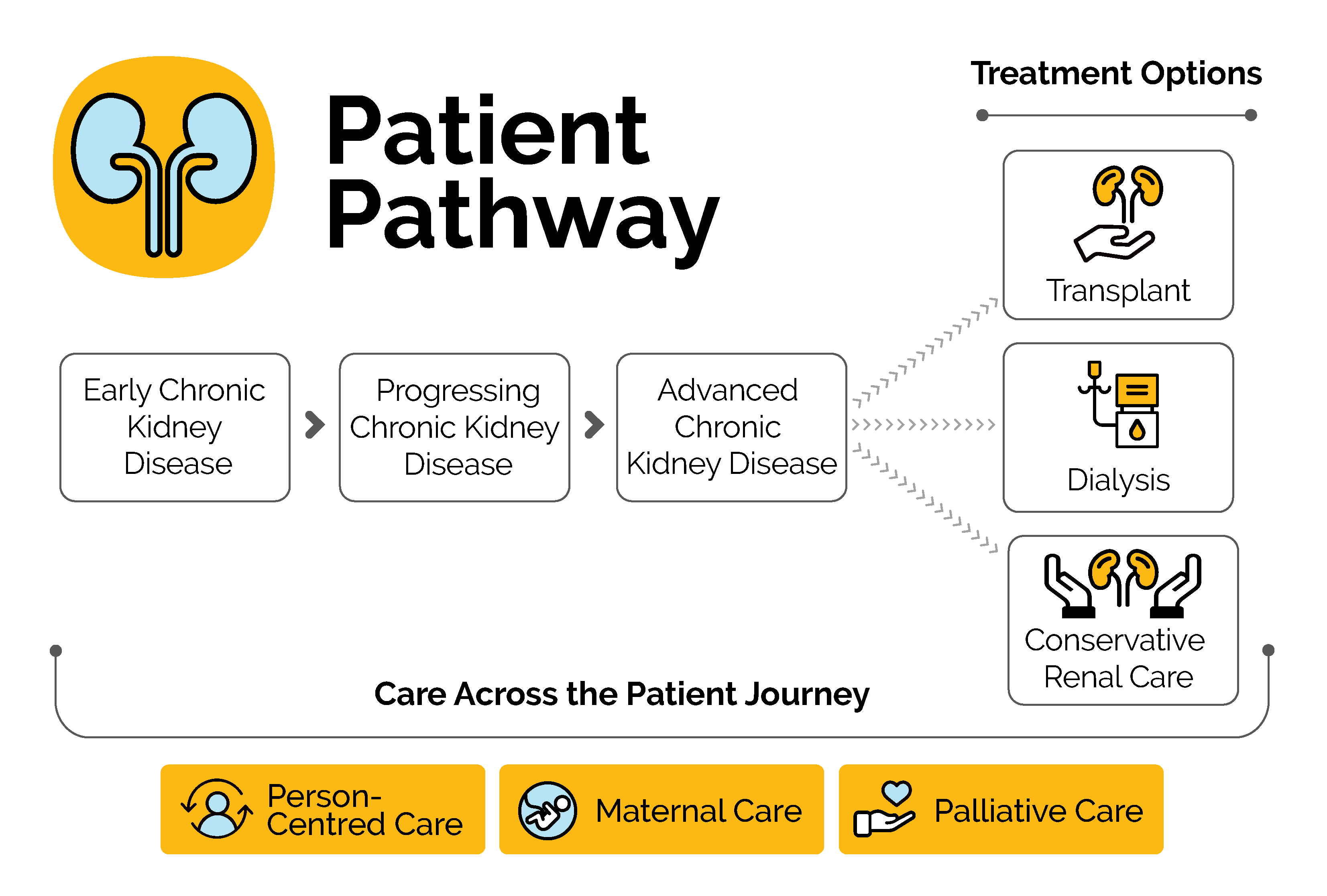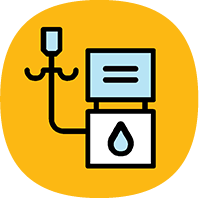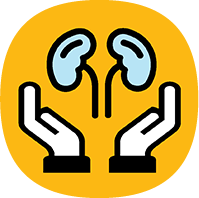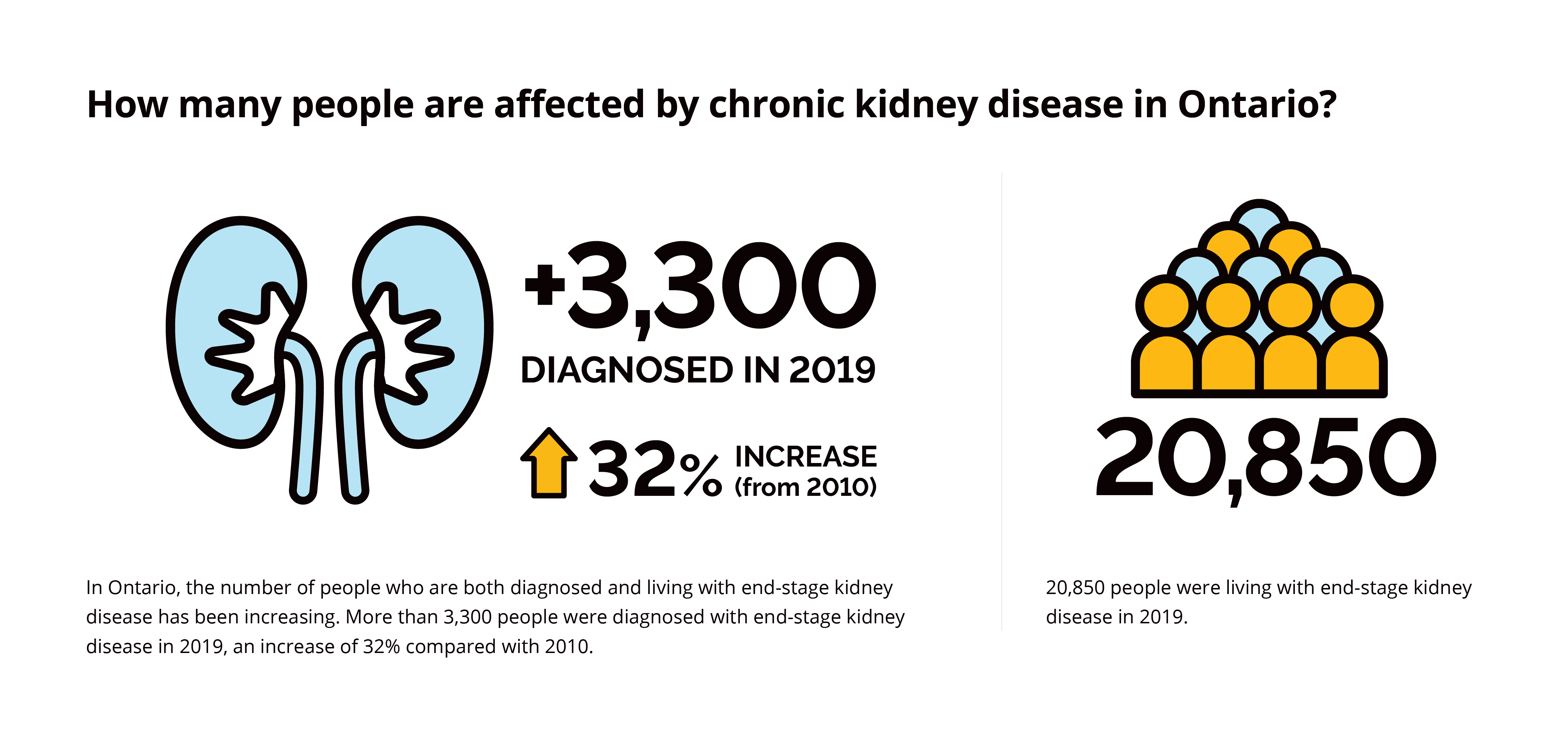Stages of Chronic Kidney DiseaseTreatment OptionsCare Across the Patient JourneyPlanning for Future Needs
Ontario Renal System Performance
The Ontario Renal Network, part of Ontario Health, uses a suite of measures to understand how the renal system is performing in Ontario. These performance measures look at how parts of the renal system work together to improve outcomes and the patient experience for people with chronic kidney disease, and provide greater value to the healthcare system.
Here we describe the typical touchpoints patients have with the renal system across the chronic kidney disease journey, and link to available performance data. The indicators we report on may change in future reports as more data becomes available.
Stages of Chronic Kidney Disease

For Ontarians diagnosed with chronic kidney disease, the disease typically progresses over time until it reaches an advanced stage. The measures in our renal system performance report reflect aspects of this patient pathway, from early identification of chronic kidney disease to treatment for people with end-stage kidney disease.

Early chronic kidney disease
The journey often begins with the primary care provider
People with rapidly declining kidney function are at high risk of progressing to an advanced stage of kidney disease. Their primary care provider might refer them to a nephrologist (a doctor who specializes in kidney disease).
Data on topics related to early chronic kidney disease may be included in future reports.

Progressing chronic kidney disease
Management of disease progression by a nephrologist
A nephrologist prescribes medications proven to delay progression of chronic kidney disease, and monitors and manages complications. People diagnosed with glomerulonephritis, a rare form of chronic kidney disease, are referred to a glomerulonephritis clinic.
Data on topics related to progression of chronic kidney disease may be included in future reports.

Advanced chronic kidney disease
Active management and education on treatment options in a multi-care kidney clinic
People who are at especially high risk of progressing to end-stage kidney disease should be referred to a multidisciplinary kidney care clinic (known as a multi-care kidney clinic) to manage their condition and help them make the treatment choices that are best for them.
Treatment Options
If a person’s chronic kidney disease progresses to an advanced stage, they may have several treatment options.

Dialysis
Cleaning the blood when the kidneys can no longer do the job
Dialysis is a life-sustaining therapy needed by most people with end-stage renal disease. It can be done either in a healthcare centre, such as a hospital, or at home.
View dialysis data.
Special: COVID-19
Vaccination coverage among the dialysis population
Dialysis patients are at a higher risk of infection, hospitalization and death from COVID-19. Vaccination is critical to protect this vulnerable population.
View data about vaccination coverage for COVID-19 in the dialysis population.

Transplant
Surgery to put a healthy kidney into a person’s body
A kidney transplant, in particular from a living kidney donor, is considered the best treatment option for eligible people with end-stage renal disease.
View kidney transplant data.

Conservative renal care
An active treatment without renal replacement therapy
Conservative renal care aims to maximize comfort and quality of life, minimize adverse events, deal with symptoms, and delay the progression of chronic kidney disease. It is full renal care that does not include dialysis or transplant. Conservative renal care is planned, holistic person-centred care for people with end-stage renal disease. Palliative care is a fundamental component of this care.
Data on topics related to conservative renal care may be included in future reports.
Learn more about conservative renal care.
Care Across the Patient Journey
Certain types of care are available throughout a person’s entire experience with the renal care system, from early chronic kidney disease to advanced kidney disease.

Maternal health
Specialized care for pregnant women with chronic kidney disease
Women with chronic kidney disease face unique challenges before, during, and after their pregnancy. These individuals are at higher risk for adverse pregnancy complications and loss or worsening of their kidney function during their pregnancy. Some women requiring renal pregnancy care have a diagnosis of glomerulonephritis, as pregnancy can also be a trigger for glomerular disease.
Data on topics related to maternal health may be included in future reports.
Learn more about pregnancy and kidney disease.

Person-centred care
Giving people a voice in their own care
Person-centred care gives people with chronic kidney disease and their families a voice in the design, delivery and evaluation of their own care. This leads to better outcomes and more effective use of resources. Making sure people are involved in, and are central to, their care is a key component of a high-quality healthcare system. When describing “excellent care,” people with chronic kidney disease and their caregivers consistently emphasize their relationships with healthcare professionals who see them as people and as respected and equal partners in their care.
Data on topics related to person-centred care may be included in future reports.
Learn more about person-centred care.

Palliative care
Preventing and easing suffering and promoting quality of life
Palliative care is not only for people who are near the end of life. It focuses on helping people with life-limiting illness to live well by relieving their symptoms and providing emotional, social and spiritual support when they need it. A person can have palliative care along with their treatment for advanced kidney disease. Our work helps provide an integrated and continuous approach to care delivered earlier and across care settings.
Data on topics related to palliative care may be included in future reports.
Learn more about palliative care.
Planning for Future Needs

Infrastructure and capacity planning
Understanding demographic and population growth
With a growing and aging population, Ontario’s renal care system faces significant infrastructure and capacity pressures. Understanding demographic and population growth patterns is important to planning for future needs.
View infrastructure and capacity planning data.



